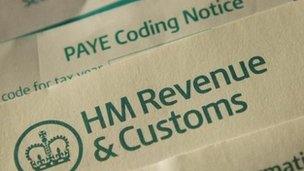Budget 2013: Tax changes 'will benefit millions'
- Published

Not everybody will gain as a result of the changes to income tax thresholds
More than 24 million people will gain by an average of £50 a year from changes to tax thresholds, but others will see rises, Budget documents show.
A planned rise in the personal allowance - the amount earned before paying income tax - was a key aspect of Chancellor George Osborne's speech.
Yet changes to the rates announced previously by Mr Osborne have brought greater benefit to those earning less than £40,000 or so.
And some higher earners will lose out.
Target
In the current tax year, the amount earned before income tax is paid is £8,105. But from 6 April, this will increase to £9,440.
The next £32,010 will be taxed at 20%, so the higher rate of 40% tax will start to be paid by those with incomes of more than £41,450.
The latest announcement by the chancellor will take the personal allowance to the coalition government's target of £10,000 a year in 2014-15, a year earlier than planned.
This will relate to people born after 5 April 1948.
That year, the next £31,865 will be taxed at 20%, so the 40% rate will kick in at £41,865.
According to the Treasury, the effect of this change will mean that in 2014-15:
Some 257,000 people will be taken out of the income tax system entirely
Some 24.5 million people will benefit, on average, by £50 after inflation. This includes 20.4 million basic rate taxpayers
However, 470,000 people who earn more than £120,000 will lose £50
The Treasury documents show that the move will cost the government just over £1bn in 2014-15.
Since the coalition government came to power, the Treasury said that 2.7 million people would be taken out of the income tax system by 2014-15 owing to a rise in the personal allowance from £6,475 in 2010-11.
However, this does not mean that they are free of all tax. Employees pay National Insurance contributions from a lower level of earnings. At present, this is 12% on earnings above £7,605.
Benefits effect
Mr Osborne's announcement that the government will hit its personal allowance target early was met with loud cheers on the government benches in the Commons.
However, accountants and lobby groups have pointed out some significant factors that arise as a result of the calculations, which are found in the small print of the policy.
For example, consumer group Citizens Advice points out that means-tested benefits are calculated after tax is paid. The higher level of post-tax income will be eaten away at slightly by a lower level of means-tested benefit.
"Current rules mean that as their income goes up, their benefit goes down, so what they are given with one hand is snatched away by the other," said Gillian Guy, the charity's chief executive.
"Increasing the tax threshold to £10,000 will deliver only £17 a year to the lowest paid."
Hardest hit
Individuals earning less in 2014-15 than at the start of the Parliament may have still been pushed into the higher rate tax bracket.
The higher rate threshold in 2010-11 was £43,875, but will be £41,865 in 2014-15. This means that some people have become higher rate taxpayers even if their wages only rose in line with inflation, an effect known as fiscal drag.
So, in effect, real terms stagnation in earnings may still have left some taxpayers paying more tax. That said, the latest change by the chancellor would see some higher rate taxpayers gaining more than basic rate taxpayers, according to Patricia Mock, of accountancy firm Deloitte.
"This contrasts with the increase to £9,440 due to come into force for 2013-14 where the changes are more beneficial for basic rate taxpayers," she said.
Patrick Stevens, tax partner at Ernst and Young, said that the 2014-15 change in the personal allowance was, in fact, not as large as previous years.
Those earning about £120,000 have effectively been hit the hardest by changes made in the last few years.
The personal allowance is gradually withdrawn for earnings over £100,000, and goes entirely at £120,000. As a result they see no benefit from the higher allowance.
The system means that for every extra pound earned between £100,000 and £120,000, they pay 60p in income tax.
A previously announced, and much debated, change to the additional rate of income tax will see a drop from 50% to 45% tax on earnings above £150,000 from 6 April this year.
There is one extra bonus for a small group of people, mainly pensioners, who pay 10% on savings if they have no other income. This is charged on a narrow band of savings above the personal allowance, so they will pay less tax because the personal allowance has gone up.